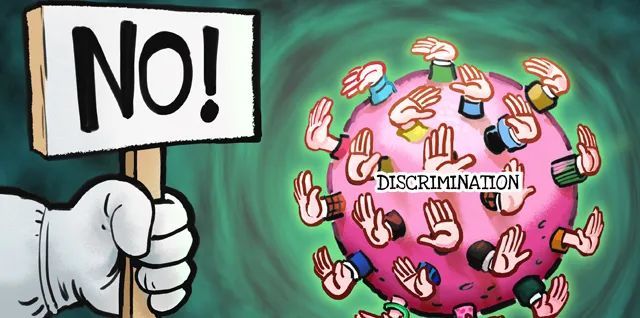可怕的是病毒,不是中国人 | 有声双语
中国人民奋力抗击新冠肺炎疫情已超过一个月。就在人们与这一高传染性“流氓病毒”搏斗最胶着、最吃劲的时候,一种“人造病毒”也在世界上一些地方浮现、传播——歧视华人与亚裔的“新黄祸论”沉渣泛起,对中国抗疫措施说三道四,歪曲抹黑……

The novel coronavirus outbreak shouldn’t be an excuse for discrimination. CHINA DAILY
↑↑点击播放音频↑↑
The sudden rise of the newcoronavirushas shocked China. Although China has been doing everything possible to stop the virus, it has spread outside of its borders and into other regions. There are nowconfirmed casesof COVID-19 in countries including the UK, Japan, Germany, Vietnam, Russia and the United States.
新型冠状病毒疫情的突然爆发震惊全国。尽管我国采取了一切可能的防疫措施,但病毒还是传播到了国外,进入其他地区。如今,英国、日本、德国、越南、俄罗斯以及美国都发现了新型冠状病毒肺炎的确诊病例。
There is a growing fear that the effects of theoutbreakwill worsen if it is not contained. This has led to countries closing borders with China and putting travelbansin place, hoping to protect their own citizens. However, fear andmisinformationhave also caused the spread of something else –racism.
人们越来越担心,如果不加以控制,疫情会变得更糟。这令一些国家关闭了与中国的边境,并发布实施旅行禁令,以此来保护本国公民。但恐惧与不实消息也助长了其他东西的传播 —— 种族歧视。
Restaurants and businesses in many tourist areas across the world have posted signs banning Chinese people. Social media users recently shared a picture of a sign outside a hotel in Rome, Italy. The sign said that “all people coming from China” were “not allowed” in the hotel. Similar signs with anti-Chinesesentimentwere also reportedly seen in South Korea, the UK, Malaysia and Canada. These signs were loud and clear – “No Chinese”.
全球许多旅游景区的餐厅和商铺都张贴了禁止中国人入内的告示。最近,有社交媒体用户分享了意大利罗马一家酒店外的告示照片。上面写着“所有来自中国的旅客”不得“进入”酒店。据报道,类似带有反华情绪的告示在韩国、英国、马来西亚、加拿大等地都有出现。这些告示都写得清清楚楚 —— “中国人勿进”。
Racist actions such as these do a lot more harm than good.
诸如此类的种族主义行为弊大于利。
“Myethnicityhas made me feel like I was part of a threatening and diseasedmass,” Sam Phan, a master’s student at the University of Manchester, wrote to the Guardian.
“我的种族让我感到自己是危险的患病群体的一份子,”曼彻斯特大学研究生萨姆·潘在《卫报》上写道。
Edith Bracho-Sanchez, an assistant professor at Columbia University Irving Medical Center, has experience working on health issues thatinvolveinternational borders. “As human beings, we are afraid of the things we don’t know, but our response should be to educate ourselves, not to further spread … fears and misunderstandings,” she said. Bracho-Sanchez suggested that the media should “stick to the facts”.
哥伦比亚大学欧文医学中心助理教授伊迪丝·布兰科-桑切斯曾对涉及国际边境的卫生问题有所研究。“作为人类,我们会害怕未知的事物,但我们的反应理应是自我教育,而不是进一步传播……恐惧与误解,”她说道。布兰科-桑切斯建议媒体应当“忠于事实”。
Phan shared a similar view: “It’s important … to see us in all ourdiversity, as individual human beings, and to challengestereotypes. Thecoronavirusis a human tragedy, so let’s not allow fear tobreedhatred, intolerance andracism.”
潘也有着类似的看法:“作为个人,看到我们的多样性并挑战刻板印象十分重要。这场冠状病毒疫情是全人类的悲剧,因此,不要让恐惧引发种族仇恨、偏狭与种族主义。”
Instead of spreadingmisinformationand fueling fearful thoughts, we should do everything we can to support those who are affected by events such as the COVID-19outbreak. After all, the real enemy is the virus, not the people who are fighting it.
我们不应传播谣言,滋长恐惧情绪,而是应当做力所能及的一切来支持受到新型冠状病毒肺炎疫情等事件所影响的人们。毕竟,大家真正的敌人是病毒,而非与之对抗的人。
以上文章英文内容选自《21世纪学生英文报》高一781期
本文英文音频由我报外籍编辑 Joe Willetts朗读







